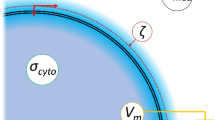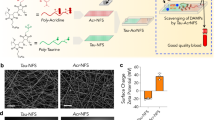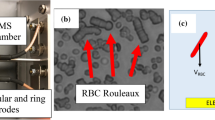Abstract
Greville and Lehmann1 reported that less hæmolysis occurred when human blood was stored with M/7 magnesium chloride as an anticoagulant than if isotonic sodium citrate was used. We have investigated this phenomenon for several reasons, one of which was its possible practical bearing on the storage of sheep blood corpuscles used for the Wassermann reaction in the diagnosis of syphilis.
This is a preview of subscription content, access via your institution
Access options
Subscribe to this journal
Receive 51 print issues and online access
$199.00 per year
only $3.90 per issue
Buy this article
- Purchase on Springer Link
- Instant access to full article PDF
Prices may be subject to local taxes which are calculated during checkout
Similar content being viewed by others
References
Greville, G. D., and Lehmann, H., J. Physiol., 103, 175 (1943).
Aub, J. C., Fairhall, L. T., Minot, A. S., and Reznikoff, P., "Medicine Monographs, Lead Poisoning, VII" (Williams and Wilkins Company, Baltimore, 1926).
Dyson, M., Plaut, G., and Vaughan, J., Quart. J. Physiol., 32, 255 (1944).
Walters, J. H., Rossiter, R. J., and Lehmann, H., "The Marasmus Syndrome, Study of 2000 cases chiefly Indian Prisoners of War Repatriated from Japanese Prison Camps" (General Headquarters, India Command, 1946).
Author information
Authors and Affiliations
Rights and permissions
About this article
Cite this article
LEHMANN, H., LAWS, J. & AHMED, N. Effect of Mono- and Divalent Salts on Red Blood Cells. Nature 159, 169–170 (1947). https://doi.org/10.1038/159169b0
Issue Date:
DOI: https://doi.org/10.1038/159169b0
Comments
By submitting a comment you agree to abide by our Terms and Community Guidelines. If you find something abusive or that does not comply with our terms or guidelines please flag it as inappropriate.



